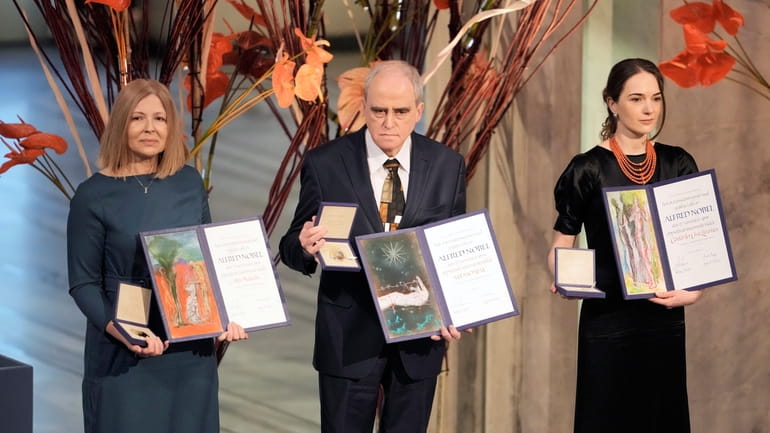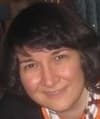Nobel Peace Prize winners united in their cause

Natallia Pinchuk, left, wife of Nobel Peace Prize winner Ales Bialiatski, Yan Rachinsky, and Oleksandra Matviychuk display the joint Nobel Peace Prize. Credit: AP/Markus Schreiber
Amid all the depressing news of war abroad and political circus at home, looking for a story that can truly inspire can be a challenge. But here’s one, just in time for the holiday season that is supposed to celebrate peace and goodwill: this year’s extraordinary Nobel Peace Prize ceremony last Saturday that brought together human rights activists from Ukraine, Belarus, and Russia.
When the joint prize awarded to the Ukrainian Center for Civil Liberties, Belarusian activist Ales Bialiatski, and Russia’s Memorial human rights group was announced two months ago, it caused some controversy. Ukrainian critics saw it as a bizarre decision simultaneously honoring Ukraine and its enemies: Russia and Belarus, whose pro-Kremlin dictator Aleksandr Lukashenko has supported and assisted Russia’s war effort.
But this complaint, while understandable, is misguided. Nobel prizes are given to individuals and organizations, not countries. Neither Memorial nor Bialiatski represent their countries’ regimes — quite the opposite. Bialiatski, the 60-year-old chairman of the “Viasna” (Spring) Human Rights Center, has been in prison for over a year awaiting trial on bogus tax evasion charges. Memorial, which works to record and expose both past and present human rights abuses in Russia, was banned last December shortly before the Russian invasion of Ukraine.
Some of the tension was evident in the Nobel Peace Prize lectures. Ukraine’s Oleksandra Matviichuk, who accepted the prize on behalf of the Center for Civil Liberties, stressed that “the Russian people will be responsible” for the war and its atrocities. Memorial’s Jan Rachinsky, on the other hand, explicitly rejected the concept of collective guilt, instead stressing that each individual in Russia must take responsibility for doing whatever he or she can do to oppose the Putin regime and its war.
But these differences fade before the common cause of opposing wars of aggression and elevating human rights. Matviichuk, who spoke movingly of the war’s horrors, called for “a new humanist movement” to affirm the values of justice and freedom and promote individual responsibility. “This movement should unite intellectuals and activists from different countries, because the ideas of freedom and human rights are universal and have no state borders,” she said.
Rachinsky spoke of the tragic destruction of civic solidarity and historical memory in Russia, enabling an onslaught of propaganda that “became the ideological justification for the insane and criminal war of aggression against Ukraine.” He readily acknowledged the shame of the war, saying that for many, “the words ‘Russian soldier’ … will now be associated not with those who fought against Hitler, but with those who sow death and destruction on Ukrainian soil.” In the end, his call for personal responsibility was not that different from Matviichuk: responsibility, he stressed, requires “work” rather than penitence.
Bialiatski's prize was received on his behalf by his wife Natallia Pinchuk, who delivered her own remarks as well as her husband’s speech. Its focus was not only on his internal freedom, intact even in prison, but on the “millions of Belarusian citizens” who have opposed their tyrannical regime. Bialiatski also noted that “the permanent struggle of good and evil has unfolded almost in its purest form throughout the region” — in the conflict between freedom and dictatorship in Ukraine, Belarus and Russia.
In wartime, Ukrainian, Belarusian and Russian human rights activists may not always find it easy to be allies in this struggle. But their cause transcends these differences. It should also be the cause of all Americans who care about freedom, justice and human dignity — values that, in our time, truly have no borders.
Opinions expressed by Cathy Young, a cultural studies fellow at the Cato Institute, are her own.

